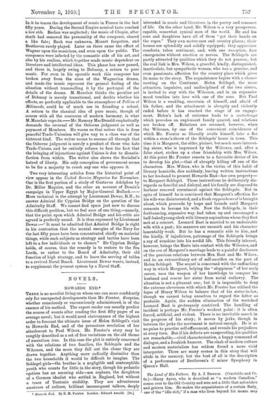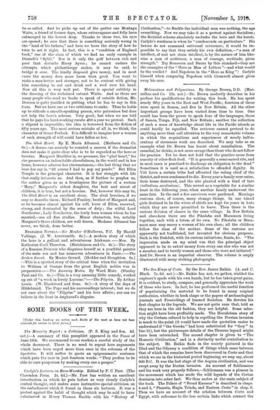The Land of His Fathers. By A. J. Dawson. (Constable
and Co. 6s.)—Harry Ayres, who is described as "a modern Canadian," comes over to the Old Country and sees not a little that astonishes and grieves him. He makes the acquaintance of a certain Bally, one of the "idle rich," if a man who lives beyond his means may be so called. And he picks up out of the gutter one Montagu Waite, a friend of former days, whom extravagance and folly have submerged in the lowest deep. Thanks to these two, his eyes are opened ; he sees that there is something seriously wrong in the "land of his fathers," and here we have the story of how he tries to set it right. In fact, this is a "condition of England book," one of the class of which we find an early example in Disraeli's "Sybil." Nor is it only the gulf between rich and poor that disturbs Harry Ayres ; he cannot endure the attempts which philanthropy makes, it may be said, to bridge it over. The kindly disposed give money, and in most cases the money does more harm than good. You want to make a man better and stronger, not to be content with giving him something to eat and drink and a roof over his head. Now all this is very well put. There is special subtlety in the drawing of the reclaimed outcast Waite. And as there are many people who read no books to speak of outside fiction, Mr. Dawson is quite justified in putting what he has to say in this form. But we have one or two criticisms to make. Thus he holds up to ridicule a smooth-speaking parson, who patronises but does not help the hero's scheme. Very good; but when we are told that he pays his hard-working curate ..f,80 a year we protest. Such a stipend is impossible; the idea. is borrowed from the fiction of fifty years ago. The most serious mistake of all is, we think, the character of Grace Porlock. It is difficult to imagine how a woman of such strength of will could have fallen so low.



































































 Previous page
Previous page